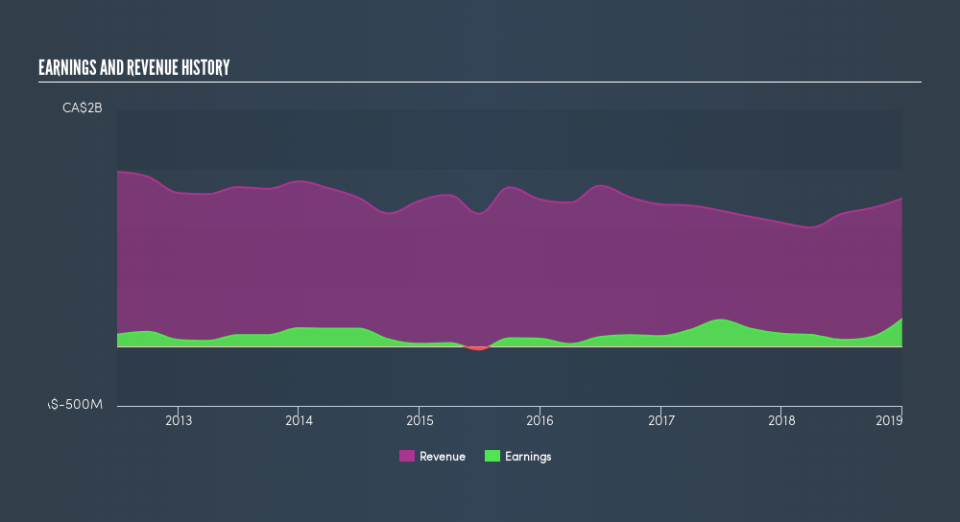Does The Capital Power Corporation (TSE:CPX) Share Price Fall With The Market?

If you own shares in Capital Power Corporation (TSE:CPX) then it's worth thinking about how it contributes to the volatility of your portfolio, overall. In finance, Beta is a measure of volatility. Modern finance theory considers volatility to be a measure of risk, and there are two main types of price volatility. The first type is company specific volatility. Investors use diversification across uncorrelated stocks to reduce this kind of price volatility across the portfolio. The second type is the broader market volatility, which you cannot diversify away, since it arises from macroeconomic factors which directly affects all the stocks on the market.
Some stocks mimic the volatility of the market quite closely, while others demonstrate muted, exagerrated or uncorrelated price movements. Beta can be a useful tool to understand how much a stock is influenced by market risk (volatility). However, Warren Buffett said 'volatility is far from synonymous with risk' in his 2014 letter to investors. So, while useful, beta is not the only metric to consider. To use beta as an investor, you must first understand that the overall market has a beta of one. A stock with a beta below one is either less volatile than the market, or more volatile but not corellated with the overall market. In comparison a stock with a beta of over one tends to be move in a similar direction to the market in the long term, but with greater changes in price.
View our latest analysis for Capital Power
What we can learn from CPX's beta value
Given that it has a beta of 0.80, we can surmise that the Capital Power share price has not been strongly impacted by broader market volatility (over the last 5 years). If history is a good guide, owning the stock should help ensure that your portfolio is not overly sensitive to market volatility. Many would argue that beta is useful in position sizing, but fundamental metrics such as revenue and earnings are more important overall. You can see Capital Power's revenue and earnings in the image below.
How does CPX's size impact its beta?
Capital Power is a fairly large company. It has a market capitalisation of CA$3.2b, which means it is probably on the radar of most investors. When large companies like this one have a low beta value, there is usually some other factor that is having an outsized impact on the share price. For example, a business with significant fixed regulated assets might earn a reasonably predictable return, regardless of broader macroeconomic factors. Alternatively, lumpy earnings might mean minimal share price correlation with the broader market.
What this means for you:
The Capital Power doesn't usually show much sensitivity to the broader market. This could be for a variety of reasons. Typically, smaller companies have a low beta if their share price tends to move a lot due to company specific developments. Alternatively, an strong dividend payer might move less than the market because investors are valuing it for its income stream. In order to fully understand whether CPX is a good investment for you, we also need to consider important company-specific fundamentals such as Capital Power’s financial health and performance track record. I highly recommend you dive deeper by considering the following:
Future Outlook: What are well-informed industry analysts predicting for CPX’s future growth? Take a look at our free research report of analyst consensus for CPX’s outlook.
Past Track Record: Has CPX been consistently performing well irrespective of the ups and downs in the market? Go into more detail in the past performance analysis and take a look at the free visual representations of CPX's historicals for more clarity.
Other Interesting Stocks: It's worth checking to see how CPX measures up against other companies on valuation. You could start with this free list of prospective options.
We aim to bring you long-term focused research analysis driven by fundamental data. Note that our analysis may not factor in the latest price-sensitive company announcements or qualitative material.
If you spot an error that warrants correction, please contact the editor at editorial-team@simplywallst.com. This article by Simply Wall St is general in nature. It does not constitute a recommendation to buy or sell any stock, and does not take account of your objectives, or your financial situation. Simply Wall St has no position in the stocks mentioned. Thank you for reading.

 Yahoo Finance
Yahoo Finance 
